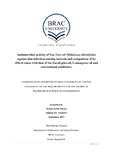| dc.contributor.advisor | Hossain, Dr. M. Mahboob | |
| dc.contributor.author | Mumu, Sinthia Kabir | |
| dc.date.accessioned | 2018-01-28T09:28:20Z | |
| dc.date.available | 2018-01-28T09:28:20Z | |
| dc.date.copyright | 2017 | |
| dc.date.issued | 2017-09 | |
| dc.identifier.other | ID 13326013 | |
| dc.identifier.uri | http://hdl.handle.net/10361/9268 | |
| dc.description | This thesis report is submitted in partial fulfillment of the requirement for the degree of B.Sc in Microbiology, 2017. | en_US |
| dc.description | Cataloged from PDF version of thesis report. | |
| dc.description | Includes bibliographical references (pages xi-xii). | |
| dc.description.abstract | The last several years it’s seen that rising number of bacteria is developing resistance to synthetic antibiotics which hinders combating infective health conditions. It’s known to everyone that most antibiotics no longer work; infections are getting harder or impossible to control. It is high time to find alternative to antibiotics from natural sources.
Tea Tree oil (TTO) is known to have antibacterial effects and this study was aimed to determine the abilities to control the growth of some skin infection causing bacteria and also compared the antimicrobial effectiveness of Eucalyptus oil (ECO), Lemongrass oil (LGO) and some common antibiotics those are using for bacterial infection. This study of antibacterial activity against selected pathogens was done by Broth dilution method and Agar well diffusion method. Pathogens (Staphylococcus aureus, Streptococcus pyogenes, Pseudomonas aeruginosa, Proteus vulgaris, Aeromonas hydrophila, Escherichia coli, Streptococcus pneumoniae, Bacillus subtilis, Klebsiella pneumonia and Streptococcus agalactiae) were taken for this study.
The inhibition of bacterial growth after 24 hours incubation exhibits greater results than 6 hours incubation in most of the cases. Tea Tree oil showed 100% inhibition against almost all the bacteria selected for this study whereas Eucalyptus oil showed minimum 21.87% against E.coli and maximum 100% inhibition against P. vulgaris and A. hydrophila and the another essential oil that is Lemongrass oil exhibited minimum 72.72% against S. agalactiae and maximum 100% inhibition against S. aureus, P. vulgaris and A. hydrophila. TTO showed noticeable zone against all the tested bacteria in well diffusion method. On the other hand, ECO and LGO didn’t exhibit satisfactory results in well diffusion method; most of the bacteria exhibited very low degree of sensitivity moreover others were resistant to eucalyptus and lemongrass oil. At last, there was a comparison between tea tree oil and some broad spectrum antibiotics by well diffusion method. Tea tree oil exhibited observable zone against all the bacteria contrariwise, among nine antibiotics only two of them were showed noticeable zone of inhibition to all the bacteria tested others didn’t exhibit any zone of inhibition to multiple bacteria. From above results, it is expected that natural elements will gradually take place of antibiotics as conventional antibiotic become resistant day by day against emerging bacteria. | en_US |
| dc.description.statementofresponsibility | Sinthia Kabir Mumu | |
| dc.format.extent | 62 pages | |
| dc.language.iso | en | en_US |
| dc.publisher | BRAC University | en_US |
| dc.rights | BRAC University thesis reports are protected by copyright. They may be viewed from this source for any purpose, but reproduction or distribution in any format is prohibited without written permission. | |
| dc.subject | Essences and essential oils | en_US |
| dc.subject | Eucalyptus oil | en_US |
| dc.title | Antimicrobial activity of Tea Tree oil (Melaleuca alternifolia) against skin infection causing bacteria and comparison of its effectiveness with that of the Eucalyptus oil, Lemongrass oil and conventional antibiotics. | en_US |
| dc.type | Thesis | en_US |
| dc.contributor.department | Department of Mathematics and Natural Sciences, BRAC University | |
| dc.description.degree | B. Mircobiology
| |

